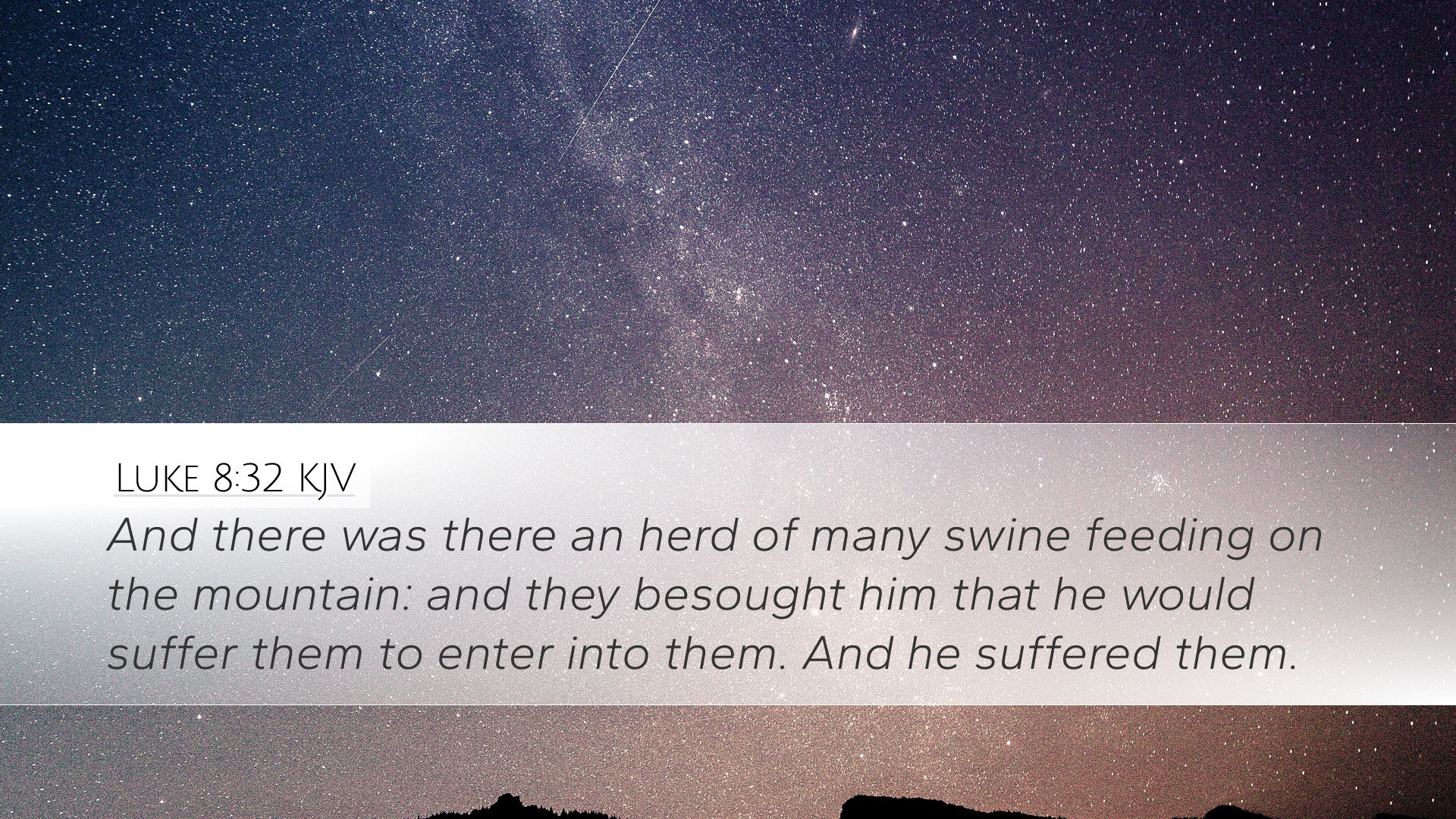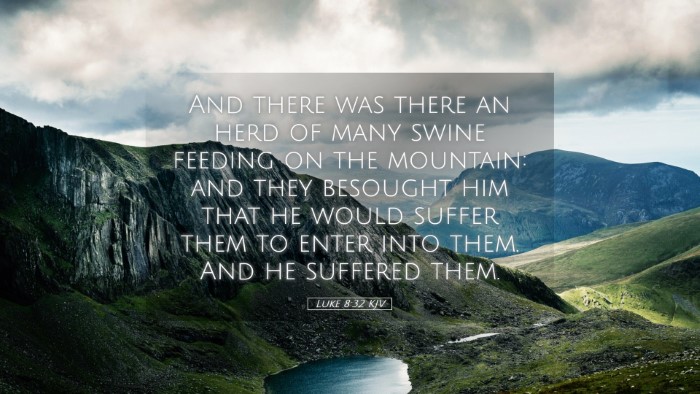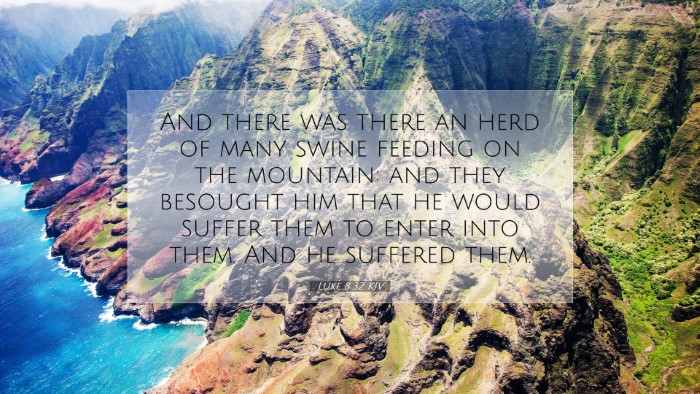Commentary on Luke 8:32
Luke 8:32 presents a profound encounter between Jesus and a legion of demons inhabiting a man. This verse states:
"And there was there a herd of many swine feeding on the mountain: and they besought him that he would suffer them to enter into them. And he suffered them."
In order to glean deeper insights into this text, we draw upon the commentary of several esteemed theologians and scholars.
Contextual Background
In the previous passage, we find Jesus crossing the Sea of Galilee, demonstrating His authority over nature. The narrative shifts dramatically as He arrives at the land of the Gadarene, where He encounters a man possessed by demons. This sets the stage for the events involving the swine and illuminates aspects of spiritual warfare, the nature of unclean spirits, and the impact of Jesus's authority.
Commentary Insights
Matthew Henry's Perspective
Matthew Henry emphasizes the significance of Jesus's power over evil spirits. He notes that the presence of the swine reflects the depravity of the region, indicating a society not strictly adhering to Jewish laws, particularly concerning unclean animals.
- The Request of the Demons: Henry points out that the demons beseech Jesus, showing their fear of being cast out without a destination. Their request to enter the swine reveals their desire to remain in the vicinity and continue their influence.
- Symbolism of the Swine: The swine symbolize the spiritual condition of the locality. Their eventual destruction serves as a lesson regarding the consequences of spiritual bondage and rebellion against God.
Albert Barnes' Analysis
Albert Barnes provides a detailed examination of the implications of this passage. He notes that the request of the demons indicates their acknowledgment of Christ's authority.
- Authority of Christ: Barnes stresses that this verse demonstrates how Jesus's sovereignty even extends over the demonic realm. This episode is a vivid illustration of His power, showcasing that not only does He have the ability to heal, but He can also command the spirits, regardless of their strength.
- The Fate of the Swine: The immediate demise of the swine after the demons inhabit them underscores the destructive nature of evil. Barnes observes that this incident teaches about the inherent danger of allowing evil to be present, as it often leads to destruction.
Adam Clarke's Insights
Adam Clarke offers a theological and historical examination of the events surrounding Luke 8:32. He comments on the societal implications of the swineherds and the significance of their fate.
- Cultural Context: Clarke notes that the presence of swine would have indicated a Gentile area, as Jewish law strictly prohibited the consumption of pork. This setting highlights the reach of Christ's ministry beyond traditional Jewish territories.
- Response of the Herdsmen: Clarke emphasizes that the herdsmen’s fear and subsequent report to the city illustrates a response of awe and dread that accompanies the manifestation of Christ’s power. Their fear is a reminder of mankind's often misplaced priorities.
Theological Implications
Bringing together the insights of these commentaries, various theological themes arise:
- The Nature of Evil: The request of the demons to inhabit the swine serves as a microcosm of the broader struggle against evil. It reinforces the idea that evil cannot stand before God's will and highlights the destructive characteristics of spiritual forces.
- Christ's Sovereignty: Each commentary resonates with the truth that Jesus possesses ultimate authority over all creation — both the seen and unseen realms. This passage lends itself to discussions surrounding Christ’s nature as the sovereign Lord.
- Human Response to Divine Power: The reactions of the townspeople and the herdsmen provoke further reflection on how humanity interacts with the divine. Instead of embracing the healing power of Jesus, the swine's death leads to fear and rejection, illustrating a tragic response to redemption.
Practical Applications
For pastors, students, and theologians, Luke 8:32 serves as a reminder of several practical applications:
- Understanding Spiritual Warfare: This passage encourages believers to recognize the ongoing battle against evil forces and to rely upon Christ’s authority in spiritual matters.
- The Cost of Discipleship: The destruction of the swine prompts readers to consider the implications of following Christ, potentially facing societal rejection in pursuit of gospel truth.
- Awareness of God’s Sovereignty: The narrative affirms that, despite overwhelming circumstances, God remains in control, providing comfort in turbulent times.
Conclusion
Luke 8:32 is a profound narrative that illustrates Jesus's power over the demonic realm and His authority in the physical world. The combined insights from Matthew Henry, Albert Barnes, and Adam Clarke illuminate the theological depth and practical implications of this scripture. By grappling with the themes of evil, authority, and human response, readers are invited to dwell deeply upon the nature of God’s kingdom and their place within it.


